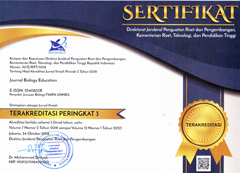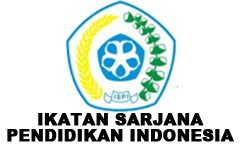PENDEKATAN JELAJAH ALAM SEKITAR DENGAN MEMANFAATKAN LABORATORIUM BIOLOGI DAN KEBUN WISATA PENDIDIKAN UNNES SEBAGAI SUMBER BELAJAR MATERI KEANEKARAGAMAN HAYATI
Abstract
Penelitian ini bertujuan mengetahui aktivitas dan hasil belajar siswa pada pembelajaran menggunakan pendekatan JAS dengan sumber belajar Laboratorium Biologi dan Kebun Wisata Pendidikan Unnes materi Keanekaragaman Hayati di MA Al Asror Gunungpati. Penelitian ini menggunakan desain quasi experimental. Sampel yang digunakan adalah kelas XA (kelas kontrol) dan XB (kelas eksperimen). Pengambilan sampel menggunakan teknik purposive sampling. Hasil penelitian menunjukan >75% aktivitas belajar siswa masuk kriteria aktif dan sangat aktif. Secara kognitif, rata-rata ketuntasan belajar siswa kelas eksperimen mencapai 96,4% sedangkan kelas kontrol 60,7%. Berdasarkan analisis data aspek psikomotorik, kelas eksperimen mendapatkan hasil lebih baik dibandingkan kelas kontrol, yaitu 100% siswa masuk kriteria A. Pada aspek afektif di kelas eksperimen 85,7% siswa masuk kriteria sangat baik, dan sisanya pada kriteria baik. Hasil analisis uji n-gain aktivitas dan semua hasil belajar kelas eksperimen memperoleh rerata lebih tinggi. Hasil rata-rata keterlaksanaan pembelajaran 98,3% siswa mengatakan terlaksana (kinerja guru sangat baik). Secara umum guru dan siswa juga memberikan tanggapan sangat baik terhadap pembelajaran yang diterapkan. Simpulan dari penelitian ini adalah pembelajaran dengan pendekatan JAS bersumber belajar Laboratorium Biologi dan Kebun Wisata Pendidikan Unnes berpengaruh signifikan terhadap aktivitas dan hasil belajar materi Keanekaragaman hayati siswa kelas X MA Al Asror Gunungpati.
The study aimed to find out the students’ activities and results in learning using JAS approach. The resources were Biology Laboratory and Educational Garden of Unnes. The material learned was Biodiversity in MA Al Asror Gunungpati. This study was done by a quasi-experimental design. The sample used was XA class (control group) and XB (experimental group).The sample was taken by purposive sampling technique. The results showed that >75% of student learning activities qualified as active and very active. Cognitively, the average completeness study of the end of the experimental class students reached 96,4% while the control group was 60,7%. Based on data analysis of psychomotor aspect, the experimental class got better results than the control class, it was 100% of students in criteria of A. The affective aspects in the experimental class showed that 85.7% of students qualified as very good, and the others were in good criteria. The results of analysis of n-gain activity test and all the experimental class learning outcomes’ mean were higher than control class. Average results of feasibility study showed that 98,3% of students said that the learning was feasible (teacher's performance was very good). In general, teachers and students also responded very well to the applied learning. The conclusion of the research results showed that learning with JAS approach which resources of Biology Laboratory and Educational Garden of Unnes had a significant effect to the activities and results in Biodiversity concept to X graders of MA Al Asror Gunungpati.
The copyright of the article once it is accepted for publication shall be assigned to the journal as the publisher. The intended copyright includes the right to publish the article in various forms (including reprints). The journal maintains the publishing rights to the published articles.
This work is licensed under a Creative Commons Attribution 4.0 International License.







